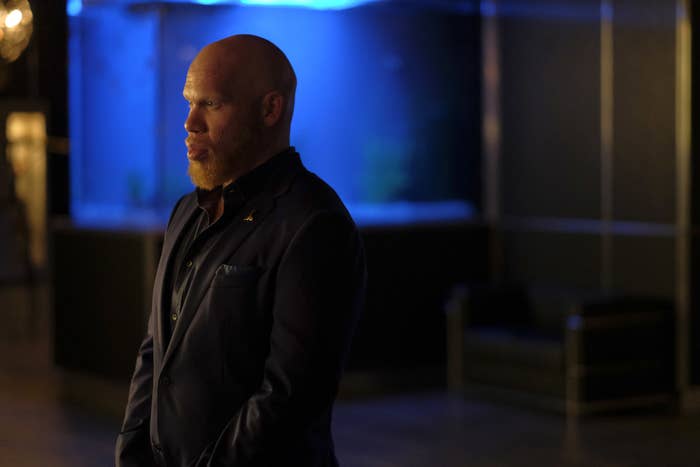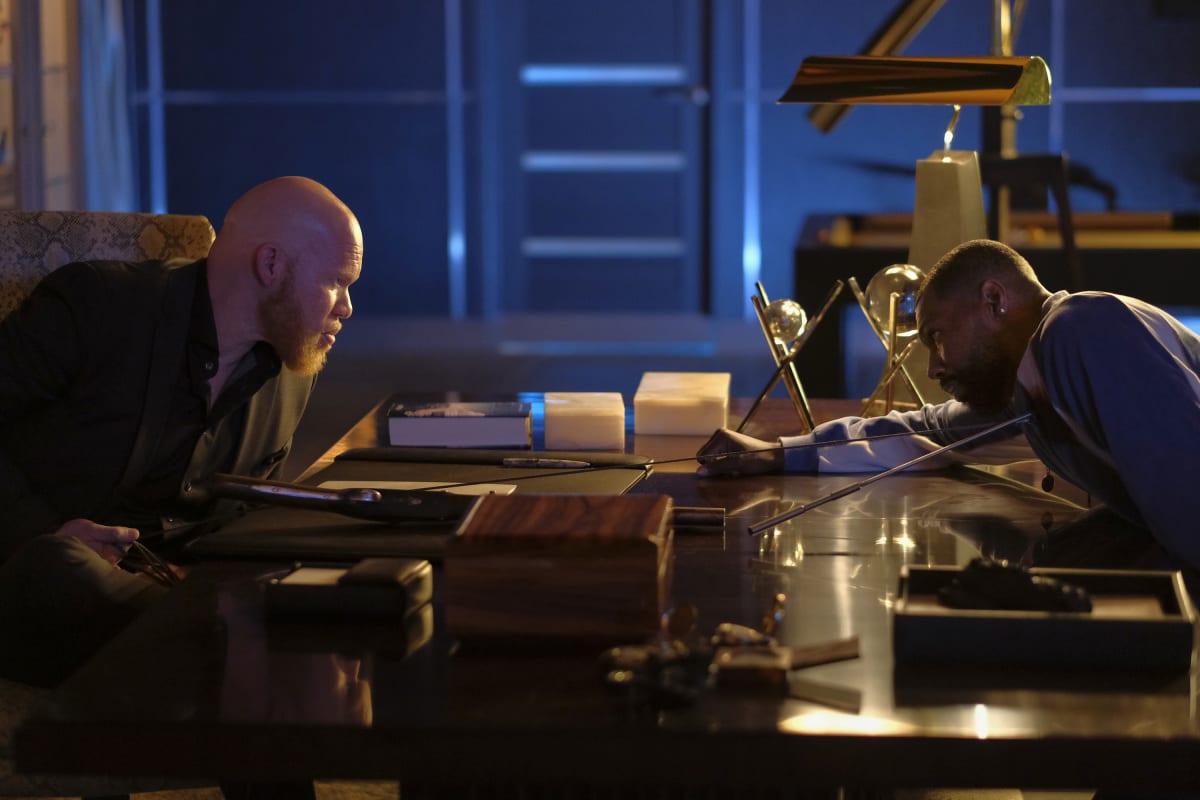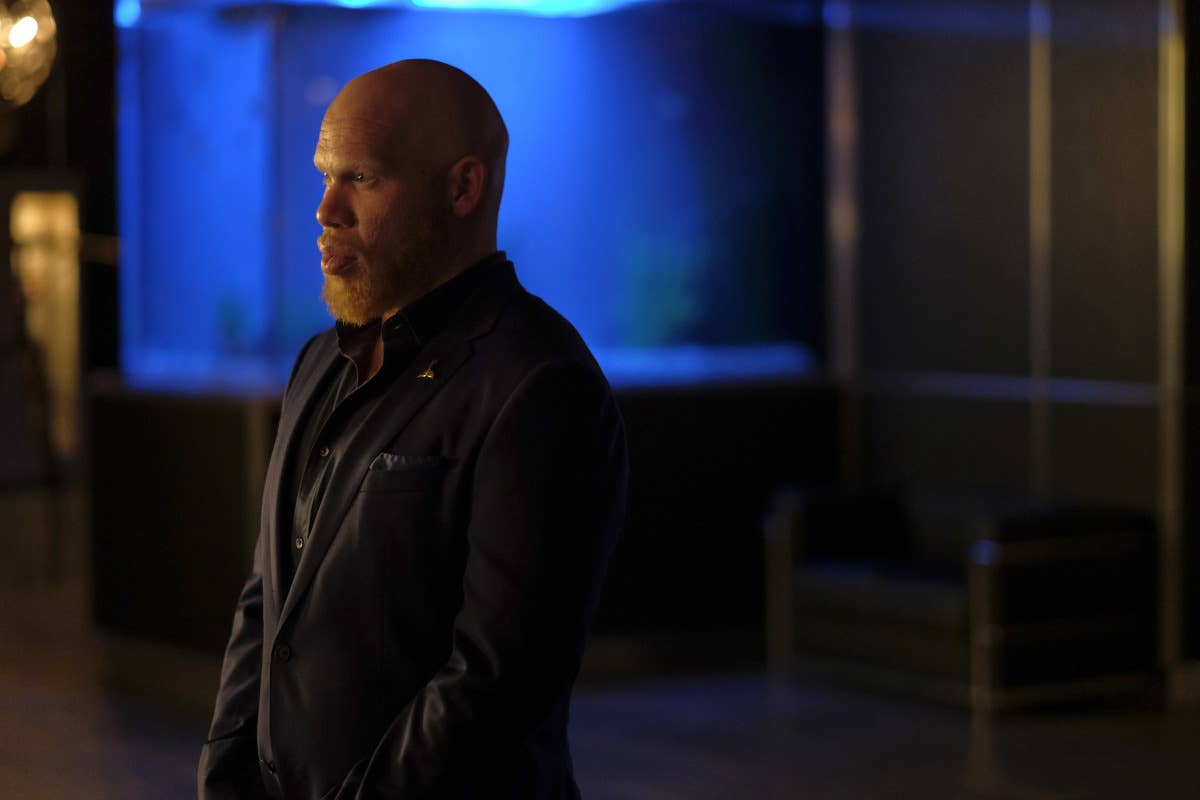
If you've been watching DC's newest TV series, Black Lightning, there's a character who may look familiar to diehard rap fans. The series' big bad, Tobias Whale, is played by none other than Marvin Jones III, better known to music fans as Krondon of West Coast rap trio, Strong Arm Steady. The leader of the 100 gang has a long history dating back to the very first issue of the Black Lightning comic in 1977. But Krondon's incarnation of the albino crime boss breathes new menace into Black Lightning's central antagonist.
Krondon, who released a solo album in 2013, has a well-established history as a songwriter, penning tunes for Xzibit, Snoop Dogg, and other artists whose names he won't mention no matter how many times you ask him. But Black Lightning is his first major acting role, and he's garnering attention for his brutal introduction, which included firing of a harpoon into the chest of one of his minions. We caught up with Krondon to find out how he made the transition from writing rhymes to doing crimes on TV, what it's like playing the bad guy, and what this role means for anyone born with albinism.
Most people are familiar with your rap career, but acting seems like a relatively new thing for you. As far as I could tell, this is more or less your first acting role. How'd you end up working on Black Lightning?
I've had some small [roles] prior to this one, but it is definitely my first big role and a big responsibility. I'm just overwhelmed by the response that I've been getting. How I went about getting it, the process was incredible actually. A friend of mine who I had had dinner with prior to getting the call was contacted by the casting agency to get in touch with me, and he called me first, actually. He said, "Hey, man, people called me in regards to you. Is it okay if I give 'em your number?" And I said, "Yeah, sure."
After that one conversation, 20 minutes later, I'm getting a call from Vickie Thomas, the casting director on the show. That led to us setting up the time to meet, and for me to audition for the part. She sent me the role, I did a lotta research on the characters. I had heard of Black Lightning before, but I wasn't too familiar with Tobias Whale particularly. So I did some homework on that, got myself in order, and went into the audition and thankfully, I did what I was supposed to do, I guess, 'cause I'm here now talkin' to you, right?
You and the character have one major thing in common, which is that you're both African-American and have albinism. What does it mean to you to play someone like that on television?
You know, it's funny. My career in music is going on about 17, 18 years now. And for a long time, in rap and in hip-hop, I was the only African-American with albinism that had some popularity. I took that with high regard. Over the years, music's taken me places that I never thought, you know? Not only through touring and putting out records, but just the visibility that it gave me, being such a unique looking man, and having the opportunity to speak to people about having albinism and actually defy the odds that are stereotypically put on people that have albinism. I always felt it to be an honor, something that was given to me by the graces of God.
The fact that Tobias Whale was written as an albino character had to play into it as well, right?
[Black Lightning executive producers] Salim Akil and Mara Brock Akil had a vision of black life. Of course, like you say, from the beginning in the comic book [Tobias] was written that way. But they could've taken it any way they wanted to, I do know that. They stayed true to what it was supposed to be, and I'm honored to play that. I'm honored to be in that position, not only to be coming from music, but just as an actor now, with albinism. An African-American with albinism, in such a prominent role—even though I'm the villain. The role is so prominent for the storyline.
So I can only imagine other kids out there, men and women alike, and not just African-Americans; all humans with albinism. 'Cause albinism is a genetic condition that runs through all races, that actually ties all races together. It's a symbol for all of 'em, and an encouragement, and it should be a motivation for all artists, entertainers, teachers, doctors, lawyers, bus drivers—anybody with albinism out there. This should be an encouraging time for you right now, and for me.
Tobias Whale has existed in various forms and storylines since the 1970s. What are you bringing to him that's different?
I don't like to toot my own horn, that's not me at all, so if it sounds facetious in any way, forgive me, okay? I'm giving you the warning now. But I'm a lot sexier than the guy in the comics [laughs]. And I say that jokingly. But wholeheartedly and honestly, I'm grateful that Salim and Mara and the people at Warner allowed me to be me within the role, 'cause if you follow the comics, you'll know that the brother... although we do look alike and have the albinism trait in common, there's a lot of differences in our physicality.
I wasn't concerned, 'cause I would've did everything that was asked of me for the part. But I was wondering if I was gonna have to do any prosthetics or additions or makeup or anything. And if you know me, and you know Krondon or Marvin Jones the man, then you know that the Tobias Whale is in physicality totally me—minus the beard; I think this is the most hair I've had on my face ever [laughs]. But I love it, it's a great look, man.
I was wondering about the overlap between these two phases of your career. You have 16, 17 years of performing on stage as a rapper and being in front of cameras for videos. What could you take from your previous career to help you, and what were the big challenges transitioning to acting?
That's a very good question. I think one of the first big challenges for me was understanding that I have had a lot of experience putting my own personal persona, and what I wanted to write, my own story. That's the thing that I've found, as an actor, as opposed to a musician. When you're a hip-hop artist, you're able to tell your story, whatever that may be. Acting, the challenge of it and where the skill and craft for it comes in, is you have to depict someone else's story in a way that is extremely believable.
So that was the first challenge, and I was fully excited and up for that challenge. If you've followed my career, then you know I've had ups and downs, and I've had a lot of wins and losses, peaks and valleys. And I'm happy to say that through those things and trial and error, I've learned a lot, the do's and the don'ts. What I've learned is no matter what—if you're a rapper, an actor, you do makeup, publicity, lighting, camera work, management, whatever the role is—you have certain responsibilities. These are things that my rap career taught me, and I'm able to exercise those things almost with a clean slate in the world of acting.
No one goes through life thinking of themselves as the villain, and I assume that's true of Tobias Whale. What did you have to think about to understand his motivations, and not just think of him as the "bad guy?"
In preparing for this role, I had to be honest with myself, look myself in the mirror and find those places and those times in my life where I have been the villain... I think we all have that in us. And I'm just happy that through this role, I'm able to exhaust my inner villain.
One thing I will say— and you gotta feel me on this one—is that we all have a vast complexity of emotions inside of us, and sides of us. Whether it be our romantic side, whether it be our intellectual side, our funny side, mean side, sarcastic side, evil side, or not-so-good side. And I say that to say that everybody makes choices throughout their day, every day. We wake up as individuals and we make a choice to suppress a certain side of us or to bring it to the forefront.
In preparing for this role, I had to be honest with myself, look myself in the mirror and find those places and those times in my life where I have been the villain, and I was the villain, and I felt like the villain and I wanted to be the villain. I think we all have that in us. And I'm just happy that through this role, I'm able to exhaust my inner villain [laughs].
There have been plenty of rappers over the years—some of whom you've been friends with, like Xzibit—who have made the transition into acting. Did you ask any of them for advice?
Oh, yeah, for sure. Big shout out to Xzibit. He gave me a huge break with my career in music, and I was able to watch him transition and transform into the great actor that he is now.
I've spoken to everybody from Mos Def to Method Man to Common about acting. And even other actors, who started in music and have gone on to Oscar-award-winning actors, like Mahershala Ali. I've had the opportunity to speak to a lot of people in making this transition. I'm very privileged and honored and very grateful to be able to speak to these brothers, and have built these relationships through music. Even Black Thought, David Banner; gotta shout out them, too, 'cause they've been very helpful and very supportive, just by leading by example and always being a word of advice and reason throughout this. It's amazing for me that I'm even included in this list now.
Can we expect to see cameos from any of these guys, as maybe members of the 100 gang?
[Laughter] That would be awesome, man. You know what, I'll actually have to ask the bosses, but I'm definitely not opposed to that. And there are some surprises up on the musical side coming up. I won't give anything away too much, but keep watching and following the show and you'll definitely see some musicians-slash-actors, on the show.

Some of the other DC television series have a lighter, more science fiction-y tone. Black Lightning, at least from what we've seen so far, covers very real issues. Was that important to you?
Yeah. I think that the impact of it and how it relates to the social happenings of today is a one of a kind thing. Again, I feel very privileged to be part of it, and my hat's off to Salim and Mara and [co-executive producer] Greg Berlanti for having that vision and taking that chance. I think that our show is very relatable to today's environment, especially in the urban community, and in every community. What's happening in the family situation, between Jefferson and his daughters, I think that all walks of life can relate to that, and how real it is, and the dangers and the privileges both that come along with being a parent. I'm a parent, so I know how real these things are. I think that's part of it, just the dangers that we all face; the show is gonna deal with that.
Will we hear any of your songs on the soundtrack?
You gotta just keep listening, man. Shout out to my brother Godholly, who actually did the theme song, which I love, and some other songs you'll hear throughout the series. I'mma just leave it a surprise, man. I'mma let you just keep listening and watching, and hopefully you'll hear me in other ways. I'mma be honest with you: I've been focused on the role and Tobias Whale. It's a big thing that hopefully will be in your home for years to come. I'm so thankful and grateful for the support, and the reception we've received so far, and Tobias Whale will be a pillar of that. So I'm really focusing and making sure that character is engrained in the hearts, minds and spirits of America and the world over. So I'm focused on that right now.
Hopefully it won't be the last of us hearing you rap, though.
No, sir. Not at all. Never that.
Excellent. One last thing: Any hints about what we can expect to see from Tobias Whale the rest of this season?
He's a really bad guy. You know, I'm glad that my name is Marvin Jones and not Tobias Whale. He's not a nice guy at all [laughs].
You will see the most methodical and heinous acts of villainous violence that you've probably seen on network television. And it's all for good reason, I will tell you that. It's all for good reason and it's all purpose-filled, if that makes sense. So continue to watch, and know that the actions of Tobias Whale don't ever reflect those of Marvin Jones [laughs].

